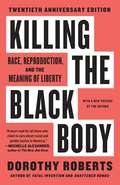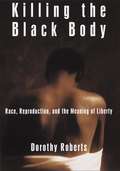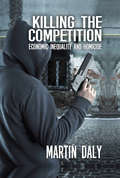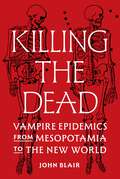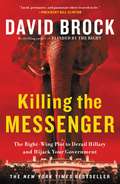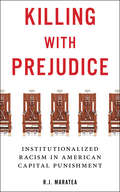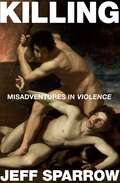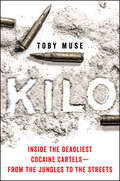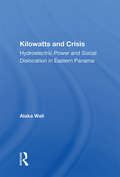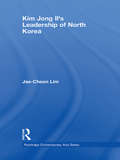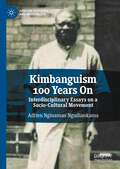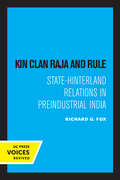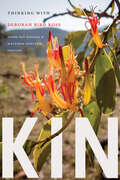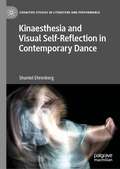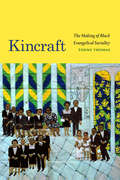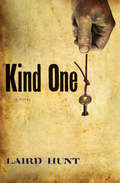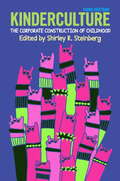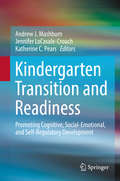- Table View
- List View
Killing the Black Body
by Dorothy RobertsThis is a no-holds-barred response to the liberal and conservative retreat from an assertive, activist, and socially transformative civil rights agenda of recent years--using a black feminist lens and the issue of the impact of recent legislation, social policy, and welfare "reform" on black women's--especially poor black women's--control over their bodies' autonomy and their freedom to bear and raise children with respect and dignity in a society whose white mainstream is determined to demonize, even criminalize their lives. It gives its readers a cogent legal and historical argument for a radically new , and socially transformative, definition of "liberty" and "equality" for the American polity from a black feminist perspective.
Killing the Black Body: Race, Reproduction and the Meaning of Liberty
by Dorothy RobertsThis is a no-holds-barred response to the liberal and conservative retreat from an assertive, activist, and socially transformative civil rights agenda of recent years--using a black feminist lens and the issue of the impact of recent legislation, social policy, and welfare "reform" on black women's--especially poor black women's--control over their bodies' autonomy and their freedom to bear and raise children with respect and dignity in a society whose white mainstream is determined to demonize, even criminalize their lives. It gives its readers a cogent legal and historical argument for a radically new, and socially transformative, definition of "liberty" and "equality" for the American polity from a black feminist perspective.
Killing the Black Body: Race, Reproduction, and the Meaning of Liberty
by Dorothy RobertsThe image of the “Welfare Queen” still dominates white America’s perceptions of Black women. It is an image that also continues to shape our government’s policies concerning Black women’s reproductive decisions. Proposed legislation to alleviate poverty focuses on plans to deny benefits to children born to welfare mothers and to require insertion of birth control implants as a condition of receiving aid. Meanwhile a booming fertility industry serves primarily infertile white couples. In Killing the Black Body, Northwestern University professor Dorothy Roberts exposes America’s systemic abuse of Black women’s bodies, from slave masters’ economic stake in bonded women’s fertility to government programs that coerced thousands of poor Black women into being sterilized as late as the 1970s. These abuses, Roberts argues, point not only to the degradation of Black motherhood but to the exclusion of Black women’s reproductive needs from the feminist agenda. Groundbreaking, authoritative, and timely, Killing the Black Body is both a powerful legal argument and a valuable aid for teachers, activists, and policy makers in creating a vision of reproductive freedom that respects each and every American.
Killing the Black Body: Race, Reproduction, and the Meaning of Liberty
by Dorothy RobertsThe image of the “Welfare Queen” still dominates white America’s perceptions of Black women. It is an image that also continues to shape our government’s policies concerning Black women’s reproductive decisions. Proposed legislation to alleviate poverty focuses on plans to deny benefits to children born to welfare mothers and to require insertion of birth control implants as a condition of receiving aid. Meanwhile a booming fertility industry serves primarily infertile white couples. In Killing the Black Body, Northwestern University professor Dorothy Roberts exposes America’s systemic abuse of Black women’s bodies, from slave masters’ economic stake in bonded women’s fertility to government programs that coerced thousands of poor Black women into being sterilized as late as the 1970s. These abuses, Roberts argues, point not only to the degradation of Black motherhood but to the exclusion of Black women’s reproductive needs from the feminist agenda. Groundbreaking, authoritative, and timely, Killing the Black Body is both a powerful legal argument and a valuable aid for teachers, activists, and policy makers in creating a vision of reproductive freedom that respects each and every American.
Killing the Competition: Economic Inequality and Homicide
by Martin DalyCriminologists have known for decades that income inequality is the best predictor of the local homicide rate, but why this is so has eluded them. There is a simple, compelling answer: most homicides are the denouements of competitive interactions between men. Relatively speaking, where desired goods are distributed inequitably and competition for those goods is severe, dangerous tactics of competition are appealing and a high homicide rate is just one of many unfortunate consequences. Killing the Competition is about this relationship between economic inequality and lethal interpersonal violence.Suggesting that economic inequality is a cause of social problems and violence elicits fierce opposition from inequality's beneficiaries. Three main arguments have been presented by those who would acquit inequality of the charges against it: that "absolute" poverty is the real problem and inequality is just an incidental correlate; that "primitive" egalitarian societies have surprisingly high homicide rates, and that inequality and homicide rates do not change in synchrony and are therefore mutually irrelevant. With detailed but accessible data analyses and thorough reviews of relevant research, Martin Daly dispels all three arguments.Killing the Competition applies basic principles of behavioural biology to explain why killers are usually men, not women, and counters the view that attitudes and values prevailing in "cultures of violence" make change impossible.
Killing the Dead: Vampire Epidemics from Mesopotamia to the New World
by John BlairA riveting history of vampire panics across cultures and down through the millennia—and why killing the dead is better than killing the livingKilling the Dead provides the first in-depth, global account of one of the world&’s most widespread yet misunderstood forms of mass hysteria—the vampire epidemic. In a spellbinding narrative, John Blair takes readers from ancient Mesopotamia to present-day Haiti to explore a macabre frontier of life and death where corpses are believed to wander or do harm from the grave, and where the vampire is a physical expression of society&’s inexplicable terrors and anxieties.In 1732, the British public opened their morning papers to read of lurid happenings in eastern Europe. Serbian villagers had dug up several corpses and had found them to be undecayed and bloated with blood. Recognizing the marks of vampirism, they mutilated and burned them. Centuries earlier, the English themselves engaged in the same behavior. In fact, vampire epidemics have flared up throughout history—in ancient Assyria, China, and Rome, medieval and early modern Europe, and the Americas. Blair blends the latest findings in archaeology, anthropology, and psychology with vampire lore from literature and popular culture to show how these episodes occur at traumatic moments in societies that upend all sense of security, and how the European vampire is just one species in a larger family of predatory supernatural entities that includes the female flying demons of Southeast Asia and the lustful yoginīs of India.Richly illustrated, Killing the Dead provocatively argues that corpse-killing, far from being pathological or unhealthy, served as a therapeutic and largely harmless outlet for fear, hatred, and paranoia that would otherwise result in violence against marginalized groups and individuals.
Killing the Messenger: The Right-Wing Plot to Derail Hillary and Hijack Your Government
by David BrockTHE NEW YORK TIMES BESTSELLERNew York Times bestselling author and founder of Media Matters, David Brock takes readers on his daring and eye-opening odyssey through the maze of political trenches. David Brock is the ultimate happy warrior. Once a leading right-wing hit man, Brock is now the Left's pre-eminent defender and truth-teller. In this incisive, personal account, Brock disarms the major tentacles of the Republican Leviathan: the Koch Brothers, the Clinton haters, and the Fox Noise Machine. With the acumen of a seasoned political player, Brock takes readers inside his Democratic war rooms and their 24/7 battles with right-wing forces for control of the story lines and messages that will decide the 2016 election. And he chronicles his own evolution from lead Clinton attack-dog to one of Hillary Clinton's fiercest defenders as he knocks down the conservative case against her. Finally, KILLING THE MESSENGER provides the no holds barred playbook for what the new right-wing conspirators will do in this election cycle to tear apart the electorate-and what good, engaged, and informed citizens can do to stop them.
Killing with Prejudice: Institutionalized Racism in American Capital Punishment
by R.J. MarateaA history of the McCleskey v. Kemp Supreme Court ruling that effectively condoned racism in capital cases In 1978 Warren McCleskey, a black man, killed a white police officer in Georgia. He was convicted by a jury of 11 whites and 1 African American, and was sentenced to death. Although McCleskey’s lawyers were able to prove that Georgia courts applied the death penalty to blacks who killed whites four times as often as when the victim was black, the Supreme Court upheld the death sentence in McCleskey v.Kemp, thus institutionalizing the idea that racial bias was acceptable in the capital punishment system. After a thirteen-year legal journey, McCleskey was executed in 1991. In Killing with Prejudice, R.J. Maratea chronicles the entire litigation process which culminated in what has been called “the Dred Scott decision of our time.” Ultimately, the Supreme Court chose to overlook compelling empirical evidence that revealed the discriminatory manner in which the assailants of African Americans are systematically undercharged and the aggressors of white victims are far more likely to receive a death sentence. He draws a clear line from the lynchings of the Jim Crow era to the contemporary acceptance of the death penalty and the problem of mass incarceration today. The McCleskey decision underscores the racial, socioeconomic, and gender disparities in modern American capital punishment, and the case is fundamental to understanding how the death penalty functions for the defendant, victims, and within the American justice system as a whole.
Killing: Misadventures In Violence
by Jeff SparrowHow hard is it to kill, as a hunter on a Kangaroo cull, as a worker in an abattoir, as an executioner in a prison, as a soldier at war?Ninety years after World War I, police in a Victorian country town uncover the mummified head of a Turkish soldier, a bullet-ridden souvenir brought home from Gallipoli by a returning ANZAC. The macabre discovery sets Jeff Sparrow on a quest to understand the nature of deadly violence. How do ordinary people—whether in today's wars or in 1915—learn to take a human life? How do they live with the aftermath?These questions lead Sparrow through history and across Australia and the USA, talking to veterans and slaughtermen, executioners and writers about one of the last remaining taboos. Compassionate, engaged and political, Killing takes us up close to the ways society kills today, meditating on what violence means, not just for perpetrators, but for all of us.
Kilo: Inside the Deadliest Cocaine Cartels—From the Jungles to the Streets
by Toby MuseThis “compelling and unforgettable” account of Colombian drug cartels follows a kilo of cocaine from the field where it was farmed to America’s shores (Jon Lee Anderson, author of Che Guevara).Cocaine is glamour, sex and murder. A product that must be produced, distributed, and protected, it is both a harbinger of violence and a source of immense wealth. Beginning in the jungles and mountains of Colombia, it filters down to countryside villages, the nightclubs of the cities, and out across the globe. Each step in the life of a kilo reveals a different criminal underworld with its own players, rules, and dangers, ranging from the bizarre to the diabolical.Seasoned reporter Toby Muse has gained unprecedented access to the people who survive on these vast enterprises—from farmers, smugglers, and assassins to the drug lords themselves. Following a kilo of cocaine from its origins to its final destination, he reveals the human lives behind the drug’s complicated legacy. Piercing this veiled world, Kilo is a gripping portrait of a country struggling to end this deadly trade even as the riches flow. Uncovering stories of violence, sex, and money, it shows the allure and the madness of cocaine—and why the War on Drugs has been no match for it.Kilo includes sixteen pages of photographs.
Kilowatts And Crisis: Hydroelectric Power And Social Dislocation In Eastern Panama
by Alaka WaliThis book tells the story of the people of the Bayano region: the pain of resettlement and the courage with which they responded to the threat to their land 1976. The Bayano River, one of three major rivers of the Darien, rushes through the deforested basin which was to be the dam's reservoir. This was an achievement of General Omar TOirijos, th
Kim Jong-il's Leadership of North Korea (Routledge Contemporary Asia Series)
by Jae-Cheon LimKim Jong Il came to power after the death of his father Kim Il Sung in 1994. Contrary to expectations, he has succeeded in maintaining enough political stability to remain in power. Kim Jong Il's Leadership of North Korea is an examination of how political power has been developed, transmitted from father to son, and now operates in North Korea Using a variety of original North Korean sources as well as South Korean materials Jae-Cheon Lim pieces together the ostensibly contradictory and inconsistent facts into a conceptual coherent framework. This book considers Kim and his leadership through an analytical framework. composed of four main elements: i) Kim as a leader of a totalitarian society; ii) as a politician; iii) as a Korean; and iv) as an individual person. This illuminating account of what constitutes power and how it is used makes an important contribution to the understanding of an opaque and difficult regime. It will be of interest for upper level undergraduate, postgraduates and academics interested in North Korean politics, and also those in Political theory.
Kimbanguism 100 Years On: Interdisciplinary Essays on a Socio-Cultural Movement (African Histories and Modernities)
by Adrien Nginamau NgudiankamaFrom its genesis in 1921, Kimbanguism has constituted one of the most fascinating socio-cultural movements of the Kongo region. This interdisciplinary collection covers the socio-cultural dynamics of the Kimbanguist church and its contribution to African studies over the past hundred years. Scholars renowned for their Kongo studies work, such as Wyatt MacGaffey, John M. Janzen, and John K. Thornton, contributed to this collection.
Kin Clan Raja and Rule: State-Hinterland Relations in Preindustrial India (Center for South and Southeast Asia Studies, UC Berkeley)
by Richard G. FoxThis title is part of UC Press's Voices Revived program, which commemorates University of California Press’s mission to seek out and cultivate the brightest minds and give them voice, reach, and impact. Drawing on a backlist dating to 1893, Voices Revived makes high-quality, peer-reviewed scholarship accessible once again using print-on-demand technology. This title was originally published in 1971.
Kin: Thinking with Deborah Bird Rose
by Thom van Dooren and Matthew ChrulewThe contributors to Kin draw on the work of anthropologist Deborah Bird Rose (1946–2018), a foundational voice in environmental humanities, to examine the relationships of interdependence and obligation between human and nonhuman lives. Through a close engagement over many decades with the Aboriginal communities of Yarralin and Lingara in northern Australia, Rose’s work explored possibilities for entangled forms of social and environmental justice. She sought to bring the insights of her Indigenous teachers into dialogue with the humanities and the natural sciences to describe and passionately advocate for a world of kin grounded in a profound sense of the connectivities and relationships that hold us together. Kin’s contributors take up Rose’s conceptual frameworks, often pushing academic fields beyond their traditional objects and methods of study. Together, the essays do more than pay tribute to Rose’s scholarship; they extend her ideas and underscore her ongoing critical and ethical relevance for a world still enduring and resisting ecocide and genocide.Contributors. The Bawaka Collective, Matthew Chrulew, Colin Dayan, Linda Payi Ford, Donna Haraway, James Hatley, Owain Jones, Stephen Muecke, Kate Rigby, Catriona (Cate) Sandilands, Isabelle Stengers, Anna Tsing, Thom van Dooren, Kate Wright
Kinaesthesia and Visual Self-Reflection in Contemporary Dance (Cognitive Studies in Literature and Performance)
by Shantel EhrenbergKinaesthesia and Visual Self-reflection in Contemporary Dance features interviews with UK-based professional-level contemporary, ballet, hip hop, and breaking dancers and cross-disciplinary explication of kinaesthesia and visual self-reflection discourses. Expanding on the concept of a ‘kinaesthetic mode of attention’ leads to discussion of some of the key values and practices which nurture and develop this mode in contemporary dance. Zooming in on entanglements with video self-images in dance practice provides further insights regarding kinaesthesia’s historicised polarisation with the visual. It thus provides opportunities to dwell on and reconsider reflections, opening up to a set of playful yet disruptive diffractions inherent in the process of becoming a contemporary dancer, particularly amongst an increasingly complex landscape of visual and theoretical technologies.
Kincraft: The Making of Black Evangelical Sociality (Religious Cultures of African and African Diaspora People)
by Todne ThomasIn Kincraft Todne Thomas explores the internal dynamics of community life among black evangelicals, who are often overshadowed by white evangelicals and the common equation of the “Black Church” with an Afro-Protestant mainline. Drawing on fieldwork in an Afro-Caribbean and African American church association in Atlanta, Thomas locates black evangelicals at the center of their own religious story, presenting their determined spiritual relatedness as a form of insurgency. She outlines how church members cocreate themselves as spiritual kin through what she calls kincraft—the construction of one another as brothers and sisters in Christ. Kincraft, which Thomas traces back to the diasporic histories and migration experiences of church members, reflects black evangelicals' understanding of Christian familial connection as transcending racial, ethnic, and denominational boundaries in ways that go beyond the patriarchal nuclear family. Church members also use their spiritual relationships to navigate racial and ethnic discrimination within the majority-white evangelical movement. By charting kincraft's functions and significance, Thomas demonstrates the ways in which black evangelical social life is more varied and multidimensional than standard narratives of evangelicalism would otherwise suggest.
Kind One: A Novel
by Laird Hunt<P>As a teenage girl, Ginny marries Linus Lancaster, her mother's second cousin, and moves to his Kentucky pig farm "ninety miles from nowhere." <P>In the shadows of the lush Kentucky landscape, Ginny discovers the empty promises of Linus' "paradise"--a place where the charms of her husband fall away to reveal a troubled man and cruel slave owner. Ginny befriends the young slaves Cleome and Zinnia who work at the farm--until Linus' attentions turn to them, and she finds herself torn between her husband and only companions. <P>The events that follow Linus' death change all three women for life. Haunting, chilling, and suspenseful, Kind One is a powerful tale of redemption and human endurance in antebellum America. <P>Laird Hunt is the author of several works of fiction and a finalist for the 2010 PEN Center USA Award in Fiction. Currently on the faculty of the University of Denver's creative writing program, he and his wife, the poet Eleni Sikelianos, live in Boulder, Colorado, with their daughter, Eva Grace.
Kind und Karriere – es geht beides!: Impulse für Frauen in Führung
by Maren WölflDieses Buch ist für alle Frauen, Mütter und Leaderinnen, die sich nicht zwischen Kind und Karriere entscheiden möchten. Die Anforderungen im Beruf und auch die gesellschaftlichen und eigenen Erwartungen sind hoch. Doch die Vereinbarkeit von Karriere und Beruf muss keine Illusion sein – dafür braucht es Veränderungen sowohl in der Gesellschaft und in den Unternehmen als auch im individuellen Leben und Denken. Dazu zeigt Maren Wölfl Wege und Lösungsmöglichkeiten auf. Sie gibt Tools an die Hand, um Barrieren im Kopf zu lösen, einen verantwortungsvollen Umgang mit sich selbst zu finden und den Mut zu entwickeln, Führungskraft UND Mutter zu sein. Die Autorin beleuchtet zudem konkrete Handlungsfelder der Unternehmen und geht der Frage nach: Was können Arbeitgeber tun, um Frauen und vor allem Müttern mehr Führungspositionen zu ermöglichen, ohne dass sie ihr Familienleben vernachlässigen müssen? Eine zentrale Rolle spielt eine größere Flexibilität bei Arbeitszeit und Arbeitsort. Die Vision von Maren Wölfl ist eine bessere Arbeitswelt, in der diverse Teams erfolgreich sind und jedes Team sich darauf freut, dass eine Mutter nach der Karenz zurückkommt und einen wertvollen Beitrag leistet. Denn: Mütter haben zahlreiche Kompetenzen, die auch Führungskräfte auszeichnen. Der InhaltEs betrifft uns alle: Gesellschaft & Politik, Unternehmen und Frauen & MännerBusiness Case: Frauen und Mütter in FührungDiversity-Management, Teilzeit vs. Vollzeit, Elternzeit-ManagementEs braucht neue Vorbilder und Role Models, auch für MännerImpulse für Female Empowerment, Erfolgs-Mindset und Selbstfürsorge
Kinderculture
by Shirley R. SteinbergAmerica is a corporatized society defined by a culture of consumerism, and the youth market is one of the groups that corporations target most. By marketing directly to children, through television, movies, radio, video games, toys, books, and fast food, advertisers have produced a "kinderculture. ” In this eye-opening book, editor Shirley R. Steinberg reveals the profound impact that our purchasing-obsessed culture has on our children and argues that the experience of childhood has been reshaped into something that is prefabricated. Analyzing the pervasive influence of these corporate productions, top experts in the fields of education, sociology, communications, and cultural studies contribute incisive essays that students, parents, educators, and general readers will find insightful and entertaining. Including seven new chapters, this third edition is thoroughly updated with examinations of the icons that shape the values and consciousness of today’s children, including Twilight, True Blood, and vampires, hip hop, Hannah Montana, Disney, and others.
Kindergarten Transition and Readiness: Promoting Cognitive, Social-Emotional, and Self-Regulatory Development
by Andrew J. Mashburn Jennifer LoCasale-Crouch Katherine C. PearsThis book presents a comprehensive overview of children’s transitions to kindergarten as well as proven strategies that promote their readiness. It presents theories and research to help understand children’s development during the early childhood years. It describes evidence-based interventions that support children in developmental areas essential to school success, including cognitive, social-emotional, and self-regulatory skills. Chapters review prekindergarten readiness programs designed to promote continuity of learning in anticipation of the higher grades and discuss transitional concerns of special populations, such as non-native speakers, children with visual and other disabilities, and children with common temperamental issues. The volume concludes with examples of larger-scale systemic approaches to supporting children’s development during the transition to kindergarten, describing a coherent system of early childhood education that promotes long-term development. Featured topics include:Consistency in children’s classroom experiences and implications for early childhood development.Changes in school readiness in U.S. kindergarteners.Effective transitions to kindergarten for low-income children.The transition into kindergarten for English language learners.The role of close teacher-child relationships during the transition into kindergarten.Children’s temperament and its effect on their kindergarten transitions.Kindergarten Transition and Readiness is a must-have resource for researchers, clinicians and related professionals, and graduate students in child and school psychology, educational psychology, social work, special education, and early childhood education.
Kinderlosigkeit im Alter – (k)ein Thema?!: Eine biographische Perspektive auf die sozialen Beziehungen und Generativität kinderloser älterer Menschen
by Katrin AlertDie Studie zeigt die Vielfältigkeit kinderloser Lebensentwürfe und -verläufe auf. Dabei wird insbesondere das Phänomen erworbene Kinderlosigkeit differenzierter als in vielen bisherigen Untersuchungen beleuchtet. Zudem wird der Prozesscharakter von Kinderlosigkeit deutlich herausgearbeitet und gezeigt, dass mit dem zeitlichen Abstand im Alter die Entstehung der eigenen Kinderlosigkeit zum Teil eine Umdeutung erfährt, um von den kinderlosen Älteren sinnhaft in die Biographie gefügt werden zu können.Die AutorinKatrin Alert ist derzeit Geschäftsführerin des Forschungskollegs Wohlbefinden bis ins hohe Alter (gefördert vom Ministerium für Kultur und Wissenschaft des Landes Nordrhein-Westfalen) mit zehn Doktorand*innen an der Universität zu Köln.
Kindermedien und Rassismuskritik: Wie Schwarze Kinder die Reproduktion von Rassismus in TKKG-Hörspielen wahrnehmen (Pädagogische Professionalität und Migrationsdiskurse)
by Adolé Akue-DoviDie Hörspielreihe TKKG erfreut sich seit den 1980er Jahren großer Beliebtheit. Doch insbesondere in den ersten Folgen finden sich zahlreiche stereotype Zuschreibungen und diskriminierende Begrifflichkeiten. Die unreflektierte Verwendung von Kinder- und Jugendmedien, die rassistische Sprache und Stereotype reproduzieren, kann bei jungen Konsument*innen einen diskriminierenden Sprachgebrauch festigen und gleichzeitig verletzend und ausschließend wirken. Auf dieser Problematik aufbauend wurden in dem rassismuskritischen empirischen Band junge Schwarze Hörer*innen selbst befragt, ob und wie sie die Reproduktion von Rassismus in der Hörspielreihe TKKG wahrnehmen. Die gewonnenen Einblicke in die Erfahrungswelt und Wahrnehmung junger Schwarzer Menschen machen deutlich, dass eine rassismuskritische Auseinandersetzung mit Sprache und den vermittelten Weltbildern in Kinder- und Jugendmedien dringend fokussiert werden muss.
Kinderschutz kompakt: Regulierung, Organisation, Wandel (Studientexte zur Soziologie)
by Ingo Bode Hannu TurbaDieses Buch beschreibt wesentliche institutionelle und architektonische Grundlagen des Kinderschutzes in Deutschland. Sein Aufbau folgt der Einsicht, dass die Praxis in diesem Feld maßgeblich davon geprägt wird, was gesamtgesellschaftlich gewünscht bzw. sozialpolitisch vorgegeben wird. Insofern lässt sich diese Praxis im Kinderschutzsystem nur verstehen, wenn ein Bewusstsein für die systemexternen Hintergründe bestehender Vorgaben ausgebildet ist. Dabei geht es auch um kulturelle Einflüsse, also geläufige Deutungsmuster bzw. Vorstellungen im Zusammenhang mit dem öffentlichen Schutzauftrag, welche Institutionen im Kinderschutz stets mitprägen. Relevant sind zudem die Einbindung verschiedener Berufsgruppen und Professionen sowie die (historisch gewachsene) Trägerlandschaft, darin ausgebildete (netzwerkförmige) Beziehungen und deren jeweilige lokale Einfärbung. Dieses Buch vermittelt einen Einblick in wesentliche institutionelle Grundlagen des Kinderschutzes in Deutschland, erläutert die Eigendynamiken multiprofessioneller und lokal differenzierter Organisation und umreißt wesentliche Entwicklungstendenzen im gesamtgesellschaftlichen Kontext.
Kinderschutzbezogene Zusammenarbeit: Praktiken der Differenzierung und Entdifferenzierung (Kasseler Edition Soziale Arbeit #22)
by Carina FischerCarina Fischer untersucht Strukturen und Modi der Zusammenarbeit zwischen Allgemeinen Sozialen Diensten und Kindertageseinrichtungen nach § 8a SGB VIII. Die Studie konzentriert sich dabei auf den Umgang mit und die Bewältigung von Differenzen in der kinderschutzbezogenen Zusammenarbeit. Mittels eines qualitativ-rekonstruktiven Forschungszugangs können verschiedene Deutungs- und Handlungsmuster gebildet werden, die sich durch eine spezifische Kombination aus Praktiken der Differenzierung und Entdifferenzierung auszeichnen, die wiederum auf den Wissensbeständen der Fachkräfte beruhen sowie auf deren beruflicher Identität. Aus den Ergebnissen werden kooperationshinderliche und -förderliche Faktoren abgeleitet, deren Bedeutung über die Zusammenarbeit der analysierten Berufsgruppen hinausweist.
